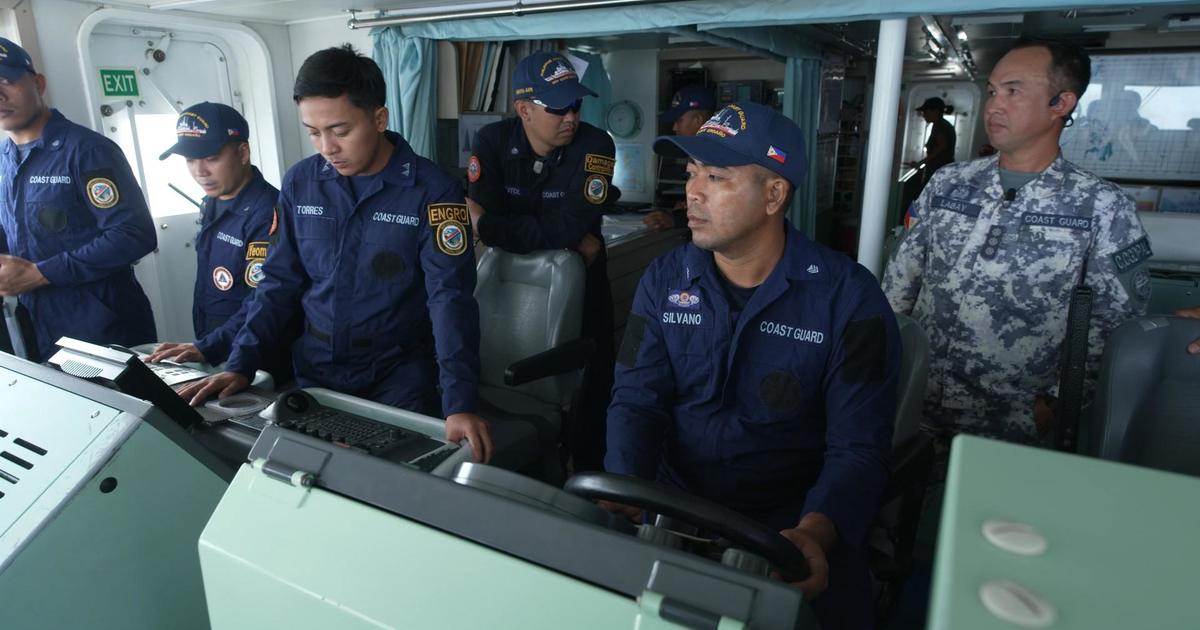An escalating series of clashes in the South China Sea between the Philippines and China could draw the U.S., which has a mutual defense treaty with the Philippines, into the conflict.
A 60 Minutes crew got a close look at the tense situation when traveling on a Philippine Coast Guard ship that was rammed by the Chinese Coast Guard.
China has repeatedly rammed Philippine ships and blasted them with water cannons over the last two years. There are ongoing conversations between Washington and Manila about which scenarios would trigger U.S. involvement, Philippine Secretary of National Defense Gilberto Teodoro said in an interview.
“I really don’t know the end state,” Teodoro said. “All I know is that we cannot let them get away with what they’re doing.”
China as “the proverbial schoolyard bully”
China claims sovereignty over almost all of the South China Sea, through which more than $3 trillion in goods flow annually. But in 2016, an international tribunal at the Hague ruled the Philippines has exclusive economic rights in a 200-mile zone that includes the area where the ship with the 60 Minutes team on board got rammed.
China does not recognize the international tribunal’s ruling.



Meanwhile, any question I ask that has a simple answer is ignored. Why was it commonly believed that China was a civilian dictatorship in 1988, more than a few years after Mao and Dengs time? Why is the one-party state of China not considered a dictatorship when one-party states are?
This entire conversation has been moving goalposts, and every time I defined the goalposts clearly enough to not be moved, you simply ran in another direction. I may not have gotten a university degree, but you’ve still done an amazingly poor job of defending your thesis.
I will give you points on the checks and balances applied after Mao reducing the risks of harm from the dictatorship of China, but the definition of a dictatorship doesn’t rely on the benevolence of the leadership, merely the lack of power of the people to change it, which was not negated by dividing the powers of government between different levels.
I imagine that doing research on the fly for a back and forth on CCP governance, forced you to rapidly consume a bunch of half-assed Wikipedia articles, and that flood of new information felt similar to a moving goal post of sorts, but that’s in your head.
Regardless, I started, and ended, at the same position… It’s the same one that I will lay out one final time: post-Mao, pre-Xi China was not a dictatorship.
From your source:
Now, you saw the word uniparty on the Wikipedia entry for dictatorships, and assumed that applied to all uniparty government’s, but it does not.
Other metrics have to be met before it can be considered a dictatorship, for example the USSR under Stalin was a dictatorship, but not under Gorbachev. The USSR was still a repressive authoritarian one-party state, but Gorbachev was not an unaccountable autocrat without systemic checks or limits on his power.
So, back to China:
Here’s a list of Chinese presidents, but you can probably skip down to the 4th Constitution, which is the start of the era you keep bringing up.
https://en.m.wikipedia.org/wiki/List_of_presidents_of_China
Notice that these leaders come from competing factions and groups within the CCP, some more conservative, some more liberal, but more importantly, they transition power at regular intervals, well, until Xi.
So you can call them totalitarian technocrats, or authoritarian capitalists, but you can’t call them communists, and you definitely cannot call them dictators.
All that aside, I don’t know why some factual inaccuracies become commonly believed, but I guess the simple answer would be a lack of education, or interest.
Maybe a better question would be why it is you put so much faith in the average layperson’s understanding of subjects such as the history of CCP governance, or the political economies of post-Mao China…?
Edit: this isn’t a thesis I’m defending, it’s a non-controversial fact, that I resent spending so much effort to reiterate, but that’s my fault for engaging.
Imagine that your position is that the Earth is flat, and no matter what I say, you respond by telling me that my thesis regarding a theory of a round earth hasn’t been sufficiently argued.
Because that’s what’s been going on here, you’re a flat earther of post-Mao Chinese political theory.